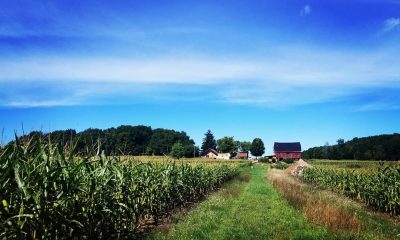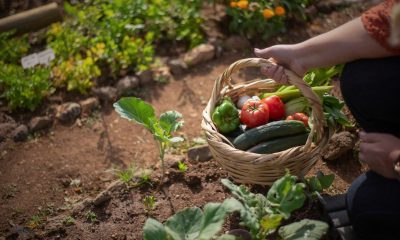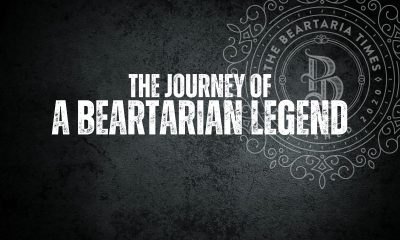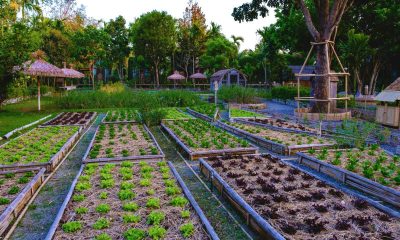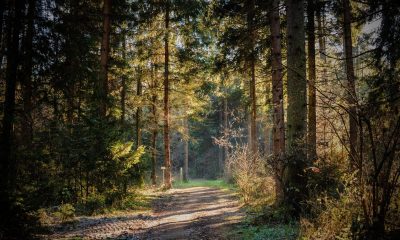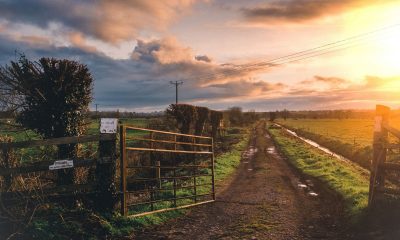Lifestyle
Marriage: A Covenant of Three
A great article on the covenant of marriage.

In an era of worldwide fear and despair, it seems only Bears still possess the desire, courage, and fortitude to marry, create children, and crush as a family.
The inversion of real marriage, cast by the “usual suspects” in radio, social media, television, and public “education” continues infecting the minds about the true commitment it requires that is only found in a covenant. The etymology or origin of the word covenant, as a noun is “mutual compact to do or not do something, a contract,” or as a verb “to enter into a formal agreement or contract.”
As Bears, Christians, Islamo-Christians, as well as in other faiths, there is an obligation to make covenants with not only our spouse, but with the Lord God Himself in marriage completely elevating the covenant. It’s now a covenant of three: God, Man, and Woman in front of loved ones and family. This ceremony is not only done to share in the celebration, but to build accountability and support in doing the work required to stay committed to the family unit when the going got tough.
“There was a time when men, other than Bears, held their word as their solemn bond. That time is returning.”
When you make a covenant to your spouse, with God, in front of friends and family, it really means something.
Very few are able to learn the tough lessons of life outside the shared view of covenant/promise found in marriage, forcing both to stay and do the hard work required to succeed. It’s a pressure cooker mixed with learning and growing, suffering and joy, compromise and change, the highest of highs and the lowest of lows. Without good ole fashion covenant found in marriage, quitting when the going gets tough, becomes all too easy.
The Lord didn’t create marriage to punish us and limit our ability to crush, although it may seem that way at times. He did it so we can find Truth, so we can experience life as it was designed, living in harmony Natural Law, Truth, Logos. Without the promise of covenant, some say loyalty beyond reason, one may never reach the depths of vulnerability required to dig deep and clean out the lies and inversion previously programmed into our character. To tolerate the type of energy output, self reflection, humility, and sacrifice it requires to level up, a covenant of three is required.
If you feel that you’ve maxed out in your life as a single person, then it’s time to level up and start a whole new journey with a partner. Go out and find a Bear worthy and willing to make a covenant with you and the Lord. Learn about yourself and others in the struggle, increase your output with new maximums you’ll find born through necessity. Create tons of children, build the kingdom of Beartaria, and Crush! Keep your covenants, and watch it bring you, closer to Truth.
Looking to see how the Bears view family… What is your definition of family? Is blood really thicker than water or is that another spell? I’d love to hear what the Bears think! Lifestyle@BeartariaTimes.com
Lifestyle
Everyone Homeschools Their Children
The question isn’t whether you homeschool your child but how you homeschool them.

The idea of homeschooling often conjures images of structured lessons at home, textbooks on the kitchen table, and parents carefully guiding their children through a curriculum. But the truth is, whether we realize it or not, we all homeschool our children daily. From the moment they are born, children absorb the world around them and learn from every interaction, observation, and experience.
The question isn’t whether you homeschool your child but how you homeschool them. Are you intentional about what they learn from you? Or are they simply picking up lessons by accident through your behavior, words, and habits?
Children are like sponges. They absorb everything from their environment, and their first teachers are always their parents. This learning doesn’t only happen when you sit them down to teach a specific skill; it happens constantly. Every interaction, every conversation, and every action you take becomes a lesson in their eyes.
Think about how children pick up the language. They don’t learn to speak because we give them formal lessons in grammar. They learn by listening to how we talk, watching our facial expressions, and understanding the emotions behind our words. The same is true for other, less obvious lessons. They learn how to handle hard times by watching how we react to pressure. They learn how to communicate by observing how we speak to others. They learn our values through the choices we make every day.
Without even realizing it, parents are teaching their children all the time, whether through how they solve problems, treat people, or manage responsibilities. This is homeschooling in its purest form—teaching through example.
Given that our children are constantly learning from us, it becomes crucial that we are intentional about what we teach. If we ignore this responsibility, they will still learn but may learn lessons we didn’t mean to impart. They might pick up our bad habits, fears, or negative attitudes.
Intentional homeschooling means controlling the lessons your child absorbs. It involves being aware of how your actions and words affect them and consciously modeling the values, habits, and skills you want them to develop.
For example, if you want your children to value hard work, it’s not enough to tell them that hard work is important. They need to see you putting effort into your tasks, staying focused, and persevering through challenges. If you want them to learn kindness, they must see you treating others respectfully. Intentional homeschooling means leading by example and being mindful of the lessons you teach through your actions and words.
One of the most powerful aspects of homeschooling, intentional or otherwise, is that learning happens everywhere. Whether your children attend a formal school or not, many of their most important lessons take place in the home.
When you cook dinner, they can learn about nutrition, math (through measuring ingredients), following plans and responsibility of tasks. When you manage resources, they learn about budgeting and the value of money. When you repair something around the house, they see problem-solving in action. And when you make time to read, exercise, or work on a hobby, they learn the importance of personal growth and lifelong learning.
These moments are opportunities to shape who your children will become. Being intentional about these everyday lessons can help your children develop a variety of skills and values that will assist them throughout their lives.
While formal education plays an important role in a child’s education, it is not a substitute for the lessons learned at home. Schools provide knowledge and skills in subjects like math, science, and literature, but they cannot teach values, ethics, or character in the same way a parent can. How you handle conflict, how you talk about your work, and even how you treat yourself all contribute to your child’s education in ways no classroom can replicate.
By understanding that education starts at home, parents can take active roles in shaping their children’s education and emotional, social, and moral development.
Everyone homeschools their children, whether we recognize it or not. Children learn constantly from their parents, picking up lessons from every action, word, and decision. The key to effective homeschooling is intentionality—making sure the lessons we teach align with the values, skills, and behaviors we want to instill in our children.
By taking an active role in our children’s education inside and outside the home, we can help them grow into thoughtful, capable, and responsible individuals. The lessons they learn from us today will shape the adults they become tomorrow. So, the next time you think about homeschooling, remember: you’re already doing it—make it count.
Lifestyle
Don’t Let the Internet Distract You From Real Life
When we divide our attention between the online world and the real world, neither gets our full focus. The more we allow ourselves to be distracted, the harder it becomes to be fully present in any moment.

In an age where information is at our fingertips and social media connects us to the world, it’s easy to lose sight of what truly matters—real life. The internet has become an integral part of modern living, offering endless streams of news, entertainment, and communication. But as beneficial as it can be, the internet also comes with a serious drawback: the ability to distract us from the richness of our real, offline lives.
The Allure of the Digital World
The internet is designed to be engaging, even addictive. Whether it’s scrolling through social media, binge-watching videos, or engaging in online debates, the digital world offers an endless source of stimulation. Algorithms are created to keep us hooked, drawing us deeper into content that is tailored to our interests and biases. Over time, this constant engagement can become a habit, pulling us away from face-to-face interactions, personal responsibilities, and the tangible world around us.
Missing Out on Real Connections
One of the most significant consequences of overusing the internet is that it can lead to a disconnection from real-life relationships. While online communication may feel like a way to stay connected, it often lacks the depth and authenticity of in-person interaction. Real connections happen when we share experiences, emotions, and moments face-to-face, unmediated by screens. Eye contact, body language, and the nuances of tone are all essential aspects of human communication that can’t be fully replicated online.
The internet often gives us the illusion of connection, but it can also contribute to loneliness and social isolation. Spending too much time online, even when engaging with others, can prevent us from nurturing our real-world relationships, leaving us feeling empty in the long run.
The Cost of Distraction
Beyond relationships, the internet can distract us from being present in our daily lives. It’s common to see people glued to their phones in social situations, at meals, or even while walking down the street. In constantly seeking entertainment or updates online, we miss the beauty and simplicity of the world around us. Nature, hobbies, and quiet moments of reflection can be drowned out by the constant noise of the digital world.
Productivity is another area that suffers. Time spent endlessly scrolling or chasing online distractions can eat into time that could be used for creative pursuits, learning new skills, or simply focusing on meaningful tasks. The result is often a feeling of being overwhelmed or behind despite hours spent in front of a screen.
The Myth of Multitasking
One of the traps of the internet is the myth that we can successfully multitask—checking emails while working, scrolling social media while spending time with family, or catching up on news while watching TV. Research, however, has shown that multitasking actually diminishes productivity and reduces the quality of our interactions. When we divide our attention between the online world and the real world, neither gets our full focus. The more we allow ourselves to be distracted, the harder it becomes to be fully present in any moment.
Taking Control of Your Time
To prevent the internet from distracting you from real life, it’s essential to take control of how you engage with it. Here are a few strategies to help:
- Set boundaries: Establish specific times to check your phone or engage with the internet, and stick to them. Create no-phone zones in your home or designate periods of the day for being offline, such as during meals or family time.
- Limit screen time: Use apps or phone settings to monitor and limit your time on social media or other distracting websites. It’s easy to lose track of how much time you spend online, so set limits that help you stay grounded in real life.
- Engage mindfully: When you do go online, be intentional about your usage. Avoid aimless scrolling or jumping from one distraction to the next. Focus on using the internet for specific purposes, such as learning something new, staying informed, or connecting meaningfully with others.
- Prioritize face-to-face interaction: Whenever possible, make an effort to meet friends and family in person. Real-life connections are richer and more fulfilling than those that occur solely online. Plan regular social activities and resist the urge to check your phone during those moments.
- Rediscover offline activities: Whether it’s picking up a hobby, exercising, or simply enjoying nature, make space for activities that don’t involve a screen. These moments will recharge you and remind you of the beauty and fulfillment that real life offers.
Real Life Matters More
The internet has its place in modern life, offering countless benefits, but it should never become more important than the world outside of it. When we allow the digital world to dominate our attention, we lose touch with the deeper, more meaningful aspects of our lives—our relationships, our passions, and our sense of presence. Real life, with all its beauty, challenges, and unpredictability, is where true fulfillment lies. Don’t let the internet distract you from that. Take control of your time, be intentional about how you use the web, and always remember to prioritize the real over the virtual.
We share our community app as often as we can. It’s just that Epic! But what makes it so remarkable is the real people who live and breathe the culture we have created together.
Beartaria is present in real life, and each individual who chooses to join the app shares tangible proof of this with each other in many ways.
Our community has a saying, “Meeting old friends for the first time.”
Individuals have organized local meetups, creating shared experiences like potlucks and campfires, building projects, and playdates for cubs, strengthening the bonds within our community.
For the last three years, our community as a whole has been invited to travel to the Missouri Ozarks and congregate at the Annual National Beartaria Times Festival.
Seeing posts about your Beartaria, be it the garden, your family, or your hobbies, is intrinsically more meaningful and inspiring when you know from personal experience that the epic crushers on the other side of those digital profiles are real people like you.
So come share your good, true, and beautiful life with other Legends on the app, and then turn off the screen as you declare, “ONWARDS TO BEARTARIA!”
If you are interested in submitting an article for BeartariaTimes.com as a guest writer please email Editor@BeartariaTimes.com.
Lifestyle
Victim Consciousness: A Poison to Cultures and Nations
While it’s true that injustice and hardship exist, victim consciousness goes beyond recognizing these challenges.

In our modern world, where social movements and political narratives dominate the realm wide conversation, one destructive mindset has quietly spread its influence: victim consciousness. This mentality, which places blame on others for our own misfortunes and holds onto a sense of helplessness, has become a poison infecting cultures and nations. It strips individuals and entire communities of their ability to thrive, progress, and build a better future. Victim consciousness is not just a personal hindrance—it’s a societal toxin that erodes the strength of entire civilizations.
What is Victim Consciousness?
Victim consciousness is the belief that external forces—whether other people, institutions, or historical events—are the sole cause of an individual’s or group’s struggles. Those who adopt this mindset see themselves as powerless, constantly at the mercy of circumstances beyond their control. Instead of seeking solutions or taking ownership of their lives, they focus on what has been done to them, often becoming stuck in a cycle of blame and resentment.
While it’s true that injustice and hardship exist, victim consciousness goes beyond recognizing these challenges. It feeds on them, turning people inward and teaching them to see the world through a lens of helplessness. This mentality places all the responsibility for change on others, making it nearly impossible for those affected to take proactive steps toward improvement.
The Spread of Victim Consciousness
In recent years, victim consciousness has been perpetuated by various cultural and political narratives. In many countries, people are told that they are defined by the injustices of the past or the oppressive systems of the present. These stories, while often rooted in truth, become dangerous when they foster an attitude of hopelessness and dependency. Entire communities are told that their futures are determined not by their actions but by external forces outside their control.
As this mindset spreads, it begins to take root not just in individuals but in the very fabric of societies. Instead of encouraging personal responsibility and collective action, cultures consumed by victim consciousness promote division and anger. Blame becomes a common language, and productive discourse is replaced by accusations. Nations that once thrived on innovation, resilience, and a spirit of overcoming challenges become stuck in stagnation, weighed down by the belief that their problems are unsolvable.
The Consequences for Cultures and Nations
The effects of victim consciousness are profound. At the individual level, it destroys a person’s sense of agency and limits their ability to grow. When people believe they are victims, they stop looking for solutions. They become paralyzed by the belief that nothing they do will change their situation, and so they give up on self-improvement, personal development, and meaningful action.
At a cultural level, victim consciousness erodes the social fabric. When entire communities adopt a victim mentality, they stop working together to build solutions. Instead of fostering innovation, collaboration, and progress, cultures entrenched in victimhood foster resentment and conflict. People stop seeing each other as potential allies or partners in overcoming challenges and instead view others as enemies or oppressors responsible for their situation.
For nations, the consequences are even more severe. When a society is divided by victim consciousness, its political and social institutions suffer. Instead of encouraging hard work, entrepreneurship, and self-reliance, nations that embrace this mentality create systems of dependency. Government programs and policies designed to address inequality often inadvertently reinforce victimhood by encouraging people to rely on external support rather than fostering independence and self-empowerment.
Furthermore, a nation consumed by victim consciousness becomes easy prey for manipulation. People of influence and power-hungry personalities exploit the mindset, pitting groups against each other and gaining power by promising to be the “saviors” of the oppressed. This leads to a cycle of division and dissatisfaction, where true progress is halted in favor of temporary solutions that only deepen the sense of powerlessness.
The Way Forward: Rejecting Victim Consciousness
To combat the poison of victim consciousness, both individuals and societies must shift their mindset from blame to empowerment. While it is essential to acknowledge injustice and inequality, it is equally important to promote personal responsibility and resilience. Real progress comes not from pointing fingers, but from taking action—both at the individual and collective levels.
- Embrace Personal Responsibility: At the heart of rejecting victim consciousness is the idea that each person is responsible for their own life. This doesn’t mean ignoring hardships or pretending that systemic issues don’t exist, but it does mean acknowledging that the power to change our lives lies primarily within ourselves. By taking ownership of our actions and choices, we regain control and can start building a better future.
- Foster a Culture of Resilience: Communities and nations must promote resilience rather than dependency. This means encouraging education, entrepreneurship, and collaboration. It means fostering a spirit of problem-solving and innovation, where people are empowered to take action and improve their circumstances. When individuals are taught to rely on their strengths and abilities, cultures grow stronger and more unified.
- Focus on Solutions, Not Blame: Progress comes from finding solutions, not from dwelling on problems. Instead of getting trapped in cycles of blame and resentment, societies must focus on what can be done to move forward. By encouraging constructive dialogue, collaboration, and goal-setting, nations can break free from the paralysis caused by victim consciousness.
Empowerment Over Victimhood
Victim consciousness is a poison that weakens individuals, cultures, and nations by promoting blame, helplessness, and division. To build strong societies, we must reject this mindset in favor of one that emphasizes responsibility, growth, and empowerment. The path to success and resilience is paved with ownership of our actions, accountability for our choices, and a commitment to finding solutions rather than dwelling on grievances.
As individuals, we must recognize that we are capable of shaping our lives and our futures. As cultures and nations, we must encourage systems and values that empower people to rise above their challenges. Only by shedding the chains of victim consciousness can we truly unlock the potential of individuals and societies to thrive.
Join a community of over 15,000 individuals inspiring each other daily with their efforts to be the changes they want to see, and build the solutions to the problems they want solved.
If you are interested in submitting an article for BeartariaTimes.com as a guest writer please email Editor@BeartariaTimes.com.
-

 Lifestyle3 weeks ago
Lifestyle3 weeks agoIndependence Isn’t for Everyone
-

 Farming3 weeks ago
Farming3 weeks agoThe Rise of Small-Scale Farming: Benefits, Challenges, and Tips for Success
-

 Just Crushing2 weeks ago
Just Crushing2 weeks agoLegends Spiral Upwards: Embracing Timeless Attributes
-

 Farming3 weeks ago
Farming3 weeks agoThe Power of Community: How Local Groups Can Strengthen Homesteads
-

 Lifestyle2 weeks ago
Lifestyle2 weeks agoBuilding a Sustainable Off-Grid Home: A Fundamental Guide
-

 Lifestyle2 weeks ago
Lifestyle2 weeks ago10 Essential Skills Every Homesteader Should Master
-

 Just Crushing1 week ago
Just Crushing1 week agoComedian Owen Benjamin Disrupts The Comedy Scene
-

 Farming3 weeks ago
Farming3 weeks agoThe Buzz and Benefits of Beekeeping for Homesteaders

